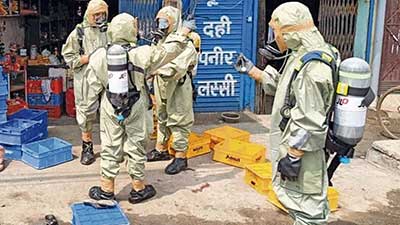Date: 03/05/2023
Relevance: GS-3: Disaster Management; Chemical Disaster.
Key Phrases: Chemical Disaster, Hydrogen Sulphide, Environment Protection Act 1986, Public Liability Insurance Act 1991, Bhopal gas tragedy of 1984, NDMA Guidelines, Emergency Response Capability, Effective Preparedness.
Context:
- Recently, Eleven people, including three children, died allegedly after inhaling toxic gas in the Ludhiana's thickly populated Giaspura locality with high levels of Hydrogen Sulphide detected in the air.
Key Highlights:
- In 2020, several lives were taken and hundreds of people sickened in Visakhapatnam, Andhra Pradesh, after hazardous styrene vapors escaped an LG Polymer India unit.
- In a country that has suffered what is widely considered the worst
industrial disaster ever, the Bhopal gas tragedy of 1984, lives lost
to poisonous fumes should be subject to ‘never again’ resolve.
- Safety standards ought to be fool-proof.
- Yet, recurring cases make it clear that we have fallen quite short.
Causes for Concern:
- According to the National Disaster Management Authority (NDMA), in the recent past, over 130 significant chemical accidents have been reported in the country, which have resulted in around 260 deaths and caused major injuries to more than 600 people.
- There are over 1861 Major Accident Hazard (MAH) units spread across 301 districts and 25 states and three Union Territories in all zones of the country.
- Further, there are thousands of registered and hazardous factories and unorganized sectors dealing with numerous ranges of hazardous materials posing serious and complex levels of disaster risks.
- Industrial effluents are suspected to be stealthily slipped into
drains or rivers in various parts of India, posing multiple threats to
human and aquatic life.
- The Ganga and Yamuna are examples of how industrial waste has turned the water of these rivers unfit for uses taken for granted by countless generations.
National Disaster Management Authority
- National Disaster Management Authority, is an apex Body of Government of India, with a mandate to lay down policies for disaster management.
- It was established through the Disaster Management Act 2005.
- It is headed by the Prime Minister of India and can have up to nine other members.
- It is responsible for framing policies, laying down guidelines and best-practices for coordinating with the State Disaster Management Authorities (SDMAs) to ensure a holistic and distributed approach to disaster management.
Provisions related to Chemical Disaster in India:
- At the time of the Bhopal gas tragedy, the Indian Penal Code (IPC) was the only relevant law specifying criminal liability for such incidents.
- Soon after the tragedy the government passed a series of laws regulating the environment and prescribing and specifying safeguards and penalties.
- Some of these laws were-
- Bhopal Gas Leak (Processing of Claims) Act 1985 :
- It gives powers to the central government to secure the claims arising out of or connected with the Bhopal gas tragedy.
- Under the provisions of this Act, such claims are dealt with speedily and equitably.
- Environment Protection Act 1986 :
- It gives powers to the central government to undertake measures for improving the environment and set standards and inspect industrial units.
- Public Liability Insurance Act 1991 :
- It is an insurance meant to provide relief to persons affected by accidents that occur while handling hazardous substances.
- National Environment Appellate Authority Act 1997:
- Under this act, the National Environment Appellate Authority can hear appeals regarding the restriction of areas in which any industries, operations or processes or class of industries, operations or processes shall not be carried out or shall be carried out subject to certain safeguards under the Environment (Protection) Act, 1986.
- National Green Tribunal 2010:
- It provides for the establishment of a National Green Tribunal for effective and expeditious disposal of cases related to environmental protection and conservation of forests.
- Bhopal Gas Leak (Processing of Claims) Act 1985 :
Way Forward:
- Routine Scanning of all waste disposal:
- In parallel with the police response, Punjab’s pollution
authorities have reportedly begun scanning all waste disposal routines
in the area.
- The entire country could do with an audit of these practices, though, given the chances of finding casual attitudes towards safety in processes that involve chemicals.
- In parallel with the police response, Punjab’s pollution
authorities have reportedly begun scanning all waste disposal routines
in the area.
- Effective Preparedness:
- The only solution to minimize the loss of lives is effective preparedness against such chemical disasters.
- Fixing of Responsibility:
- Gasses are unseen killers, mostly. While this makes it even more important for responsibility to be fixed and justice to be seen done, the worry that businesses have the clout to get away lightly for their misdeeds has also been around ever since December 1984, when Bhopal’s gas leak left thousands dead.
- Emergency Response Capability:
- Strengthening of emergency response capability in high risk areas.
- NDMA Guidelines:
- The NDMA guidelines on chemical disasters must be implemented in letter and spirit.
Conclusion:
- As we pursue ‘Make in India’, our industrial landscape can’t afford
deadly mishaps, big or small.
- In many processes, there is simply no space for error.
- We must maintain a tight vigil for the effective management of such cases.
Source: Live-Mint
Mains Question:
Q. What are the causes of concern related to chemical disasters in India? Also, discuss associated government provisions. (150 Words).







